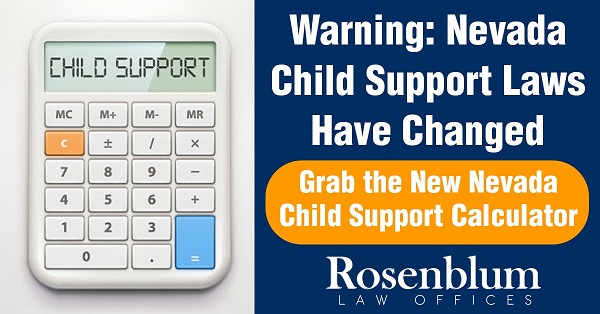Topics Discussed in this Article
- Why Nevada changed its child support laws and what are the biggest changes?
- What is considered "income" for the purposes of calculating child support in Nevada?
- How do I calculate child support and how much will my child support be?
- Can't parents just agree to child support being $0 (or some other number)?
Why Did Nevada Change The Child Support Laws and What Changed Exactly?
Despite the fact that less people are getting behind the wheel impaired, DUIs still happen daily in Las Vegas.
In this guide, we break down Nevada DUIs and explain the DUI process from start to finish.
But…before we get into the details of Nevada DUI, let’s first explain the laws.
What is considered “income” for the purposes of Nevada child support?
So . . .when the legislature was tasked with fixing the Nevada Child Support Laws, it’s not surprising that one of the first things they fixed was how to define income for the purposes of calculating support.
 Salary and wages from employment: This one is pretty basic and really needs no explanation. It’s just your pay.
Salary and wages from employment: This one is pretty basic and really needs no explanation. It’s just your pay. Overtime pay from employment as long as the overtime is consistent, substantial and can be accurately determined: We expect this one to create problems as most people don’t have “consistent” overtime. The legislature didn’t define what “substantial” means either is it 10% of regular wages or 50%? We expect that if you have overtime ever check or every other check and your overtime accounts for at least 20% of your wages, you should expect your overtime pay to be factored into a calculation
Overtime pay from employment as long as the overtime is consistent, substantial and can be accurately determined: We expect this one to create problems as most people don’t have “consistent” overtime. The legislature didn’t define what “substantial” means either is it 10% of regular wages or 50%? We expect that if you have overtime ever check or every other check and your overtime accounts for at least 20% of your wages, you should expect your overtime pay to be factored into a calculation Interest and investment income: If you are receiving income from stocks, rental income from an investment home or other investment income, this will be used in child support calculations.
Interest and investment income: If you are receiving income from stocks, rental income from an investment home or other investment income, this will be used in child support calculations.  Social security disability benefits: We know you’re thinking “but this is federal payments. How can the State consider this income?” Long story short, both federal and state laws consider disability payments as income for the purposes of calculating child support.
Social security disability benefits: We know you’re thinking “but this is federal payments. How can the State consider this income?” Long story short, both federal and state laws consider disability payments as income for the purposes of calculating child support.  Old-age benefits under federal law: Think Social Security and other benefits you might get for being a certain age.
Old-age benefits under federal law: Think Social Security and other benefits you might get for being a certain age.  Pensions payments and retirement payments: If you are receiving pension or retirement payments, this will be factored into income to calculate child support.
Pensions payments and retirement payments: If you are receiving pension or retirement payments, this will be factored into income to calculate child support.  Annuity payments from employment: Just like pension payments, annuity payments from income will also be used to calculate child support
Annuity payments from employment: Just like pension payments, annuity payments from income will also be used to calculate child support Proceeds from a worker’s compensation claim: The only portion that can be used for child support is the part intended to replace income. So let’s say work comp says you are 100% disabled and you receive $1,000 a month in work comp payments of which $500 is for pain and suffering and $500 is for lost income, the only part that can be used for child support calculations is the $500 for lost income
Proceeds from a worker’s compensation claim: The only portion that can be used for child support is the part intended to replace income. So let’s say work comp says you are 100% disabled and you receive $1,000 a month in work comp payments of which $500 is for pain and suffering and $500 is for lost income, the only part that can be used for child support calculations is the $500 for lost income Proceeds from a personal injury claim: This work just like the worker’s compensation claim. Only the amount intended to replace income can be used for child support calculations.
Proceeds from a personal injury claim: This work just like the worker’s compensation claim. Only the amount intended to replace income can be used for child support calculations.  Unemployment: This one really needs no explanation. If you receive unemployment pay, you should expect to pay child support from that benefit.
Unemployment: This one really needs no explanation. If you receive unemployment pay, you should expect to pay child support from that benefit.  Income continuation benefits: Here, think severance pay.
Income continuation benefits: Here, think severance pay.  Voluntary contributions to a deferred compensation plan, employee benefit plan or profit sharing plan: If you defer your pay, the judge will still use it for the purposes of calculations.
Voluntary contributions to a deferred compensation plan, employee benefit plan or profit sharing plan: If you defer your pay, the judge will still use it for the purposes of calculations.  Military allowances/Veteran’s benefits: This only applies for certain benefits being received by the military parent.
Military allowances/Veteran’s benefits: This only applies for certain benefits being received by the military parent.  Compensation for lost wages: If you have sued and are receiving a settlement for lost wages, or other lost wage compensation, you should expect this will factor into child support.
Compensation for lost wages: If you have sued and are receiving a settlement for lost wages, or other lost wage compensation, you should expect this will factor into child support. Undistributed business income: If you own or have an interest in a business, the undistributed business income will be considered.
Undistributed business income: If you own or have an interest in a business, the undistributed business income will be considered. Child care subsidy payments: If you are a child care provider, any child care subsidy payments you receive will be considered for child support.
Child care subsidy payments: If you are a child care provider, any child care subsidy payments you receive will be considered for child support. Alimony: That’s right! If you receive alimony, you should anticipate that your alimony will be used as income for the purposes of calculating child support.
Alimony: That’s right! If you receive alimony, you should anticipate that your alimony will be used as income for the purposes of calculating child support.  The catchall: All other income regardless of whether or not it is taxable will be considered for the purposes of child support.
The catchall: All other income regardless of whether or not it is taxable will be considered for the purposes of child support.  Child support received: If you receive child support, this will not be considered income for the child support calculations
Child support received: If you receive child support, this will not be considered income for the child support calculations Foster care payments: If you have foster children in your home and receive a subsidy for foster care, this will not be used in child support
Foster care payments: If you have foster children in your home and receive a subsidy for foster care, this will not be used in child support Kingap: Kingap is payments for foster children under a guardianship. This is not considered “income”
Kingap: Kingap is payments for foster children under a guardianship. This is not considered “income” SNAP: These benefits will not be used to calculate child support
SNAP: These benefits will not be used to calculate child support Cash county benefits: If you receive any type of cash benefit paid by the county (and we presume any other government entity like the City or State), this will not be considered for child support
Cash county benefits: If you receive any type of cash benefit paid by the county (and we presume any other government entity like the City or State), this will not be considered for child support  Other benefits not considered income: SSI payments, State supplemental payments, social services, other public assistance unless the legislature has specifically said it will count as income, pain and suffering awarded in a law suit, general damages and special damages awarded in a lawsuit not intended to replace income
Other benefits not considered income: SSI payments, State supplemental payments, social services, other public assistance unless the legislature has specifically said it will count as income, pain and suffering awarded in a law suit, general damages and special damages awarded in a lawsuit not intended to replace income
How is child support calculated under the new laws?
| Income | 1 Child | 2 Children | 3 Children | 4 Children | 5 Children or more |
| For the first $6,000 of income | 16% | 22% | 26% | 28% | 2% for each additional child |
| For up to the next $4,000 of income | 8% | 11% | 13% | 14% | 1% for each additional child |
| For any amount over the first $10,000 of income | 4% | 6% | 6% | 7% | .5% for each additional child |
Agreements For Child Support
What Is The Child Support Calculation When Only 1 Parent Works?
This question comes up a bunch in child support cases. The answer depends on WHY your ex isn’t working.
If a parent is incarcerated or in a mental institution (yes this happens from time to time), the new law says that this parent’s income is $0 if the parent is institutionalized or imprisoned for more than 180 days.
In plain language, if a parent goes to prison for 1 year, they will not have to pay child support. Likewise, if a parent is in a mental institution for 5 years, they will not have to pay support.
However, if you can show the judge that the institutionalized parent or imprisoned parent can actually pay child support regardless of their circumstances, then the child can still make a child support award against them.
- Assets
- Residence
- Employment and earnings history
- Job skills
- Education
- Literacy
- Age
- Health
- Criminal history and other employment barriers
- Record of seeking work
- The job market
- The availability of employers willing to hire the parent
- The prevailing earnings level in the local community
- Any other relevant information
Am I Required To Contribute More For My Child Or Is Everything Included In My Child Support?
 Special education needs of the child
Special education needs of the child Legal responsibility for support of others
Legal responsibility for support of others Value of services contributed by either party
Value of services contributed by either party Public assistance paid to support the child
Public assistance paid to support the child Cost of transportation to and from visitation
Cost of transportation to and from visitation Relative income of both households
Relative income of both households Necessary expenses for the benefit of the child
Necessary expenses for the benefit of the child The parent’s ability to pay
The parent’s ability to pay
When Does Child Support End?
- Category 1: You have child support that only pertains to 1 child
- Category 2: You have child support that pertains to more than 1 child and you have allocated an amount for each child
- Category 3: You have child support that pertains to more than 1 child and you HAVE NOT allocated an amount for each child.

Do I Need A Child Support Lawyer & If So, How Do I Find One?
By now you should know that our firm encourages people to reach agreements on their own, and we don’t encourage people to spend their hard earned money hiring lawyers for the sake of it.
But the real truth?
These new laws are complicated and difficult to understand.
We know the committee worked really hard to make the new laws fair, but the math and the nuances are tricky.
If you are opening a new case, pursuing a child custody case, or trying to modify an existing custody or child support case, we strongly encourage you to hire a child support lawyer.
Not sure where to find a Las Vegas attorney?
Well, if you are reading this article and you haven’t figured it out by now, we are child support lawyers and we can definitely help with your case. You can inquire about our services by calling our office at (702) 433-2889 or filing out our on-line form to get more information.
Not sure you want to hire us?
You can find research about other lawyers by doing a simple search on the internet for child support lawyers in your area. Just make sure when you talk to them that they are familiar with the new laws and understand how the calculations work.
You can also contact the State Bar of Nevada’s lawyer referral service to get the contact information for child support lawyers. Finally, you can ask other lawyers if they know anyone familiar with the child support laws in Nevada.
Regardless of who you use for your child support case, we hope you found this information helpful. If so, we’d love to hear your feedback and input. Please send us your comments or share this article on social media.

Frequently Asked Questions
How often can child support orders be modified?
Either parent can request the court modify the child support order if there has been a substantial change in circumstances, such as a loss of job or major change in income. However, the court generally will not modify child support more than once every three years unless there are exceptional circumstances.
What if the non-custodial parent lives in another state?
The child support guidelines of the state where the custodial parent resides will be used to calculate support. The order can be enforced across state lines under the Uniform Interstate Family Support Act.
What happens if I am behind on my child support payments?
You should immediately work with the other parent to come to a payment plan if you fall behind. If you cannot resolve it, your wages, tax refunds or other assets may be garnished to collect back child support owed. Contempt of court charges are also a possibility.
Can child support be waived by the custodial parent?
No, child support belongs to the child, not the parent. Custodial parents cannot waive the child’s right to support, even if they agree not to pursue child support from the other parent.
If custody changes, does child support also change?
Yes, a change in physical custody will require child support to be recalculated based on the new custody arrangement and each parent’s income and custodial time. Speak to an attorney to modify support.
Is child support taxable income?
No, child support payments are not considered taxable income to the receiving parent or tax deductions for the paying parent.

Glossary
Child support order – The legal document issued by the court that sets the amount of child support to be paid and the terms of payment.
Custodial parent – The parent that has primary physical custody of the child and is receiving child support payments from the non-custodial parent.
Emancipation – When a child reaches the age of majority (18 in most states) or is otherwise legally declared an adult, ending the legal duty to pay child support.
Imputed income – Income that is assigned to a parent by the court based on what the parent could potentially earn, used when a parent is unemployed or underemployed.
Modification – The process of changing an existing child support order by submitting a written request to the court showing a substantial change in circumstances.
Non-custodial parent – The parent who does not have primary physical custody of the child and is responsible for paying child support.
Public assistance – Government financial aid programs like Medicaid, SNAP, TANF that may impact how child support is calculated and paid.
Termination – When the obligation to pay child support ends, either because the child has reached the age of emancipation or based on the terms of the child support order.
Underemployed – When a parent is employed but not working to their full earning capacity for the purposes of avoiding higher child support.
Unemployed – When a parent has no job or source of income. Unemployed parents may have income imputed by the court.

Additional Resources for You
Molly Rosenblum, Esq., our lead attorney, has diligently developed a comprehensive suite of resources aimed at assisting individuals navigating the complexities of child support laws and modifications. These resources, available through the Rosenblum Law website, are designed to provide valuable insights, guidance, and legal advice for a variety of situations involving child support. Whether you are seeking to modify child support payments, understand how a new spouse’s income may affect child support, or are dealing with child support arrears, these resources offer in-depth information to help you through your legal journey. Here’s a summary of the resources created to assist you:
Child Support Modification: Guidance on how to request a modification of child support payments, including the necessary legal criteria and process. Explore child support modification.
Does My New Spouse Income Count for Child Support: Information on how a new spouse’s income may or may not affect your child support obligations. Learn about new spouse income and child support.
How to Get Child Support Arrears Dismissed: Advice on the possibilities and processes for getting child support arrears dismissed under certain circumstances. Understand child support arrears dismissal.
Who Has to Pay Child Support in Joint Custody: Insight into child support obligations in situations of joint custody, including factors that influence payment responsibilities. Learn about child support in joint custody.
Las Vegas Child Support Laws: Detailed information on the child support laws governing cases in Las Vegas, offering a clear understanding of legal responsibilities and rights. Explore Las Vegas child support laws.
Through these resources, Molly Rosenblum, Esq., aims to empower individuals with the knowledge and tools necessary to navigate the child support system effectively. We encourage you to make use of these resources, ensuring that you are well-informed and prepared to address any child support-related issues you may face.

Offsite Resources You May Find Helpful
Here are seven offsite resources that provide information about child support in Nevada:
FindLaw: This online resource provides free legal information, a lawyer directory, and other resources on a wide range of legal topics, including child support.
Justia: Justia offers free legal information, a directory of attorneys for various legal issues, and a specific section on family law and child support.
Avvo: This website provides a directory of lawyers, including those in Nevada, legal advice, and other resources on a broad range of legal topics, including child support.
Nolo: Nolo provides legal information to consumers and small businesses, including articles, blogs, FAQs, and news on child support issues.
LegalMatch: This online legal matching service helps individuals find lawyers in their area, including Nevada, and provides advice and resources on family law matters, including child support.
The Nevada Bar Association: The official website of the Nevada State Bar offers resources for finding a lawyer, including those who specialize in family law and child support.
Nevada Division of Welfare and Supportive Services: The official website for the Nevada Division of Welfare and Supportive Services, which manages the child support program in Nevada. It provides information about the child support process, rights, and options in Nevada.

A Special Message from Our Lead Attorney

Molly Rosenblum, Esq
Dear Reader,
I sincerely appreciate you taking the time to explore the child support resources that we’ve compiled. I understand the challenges and complexities that often come hand-in-hand with child support matters, and my hope is that these resources can provide you with some initial guidance and understanding.
However, I also recognize that every situation is distinct, and there’s no one-size-fits-all solution when it comes to matters as personal as child support. That is why my team and I at The Rosenblum Allen Law Firm are here to provide you with tailored advice and support based on your unique circumstances.
I would like to invite you to call us at (702) 433-2889. Let’s begin the conversation about your specific situation, explore the available options, and determine together the most appropriate course of action. We stand ready to provide the legal advice and guidance you need every step of the way.
Thank you once again for your trust in our resources, and I look forward to potentially working with you soon.
Best regards,
Molly Rosenblum, Esq.



